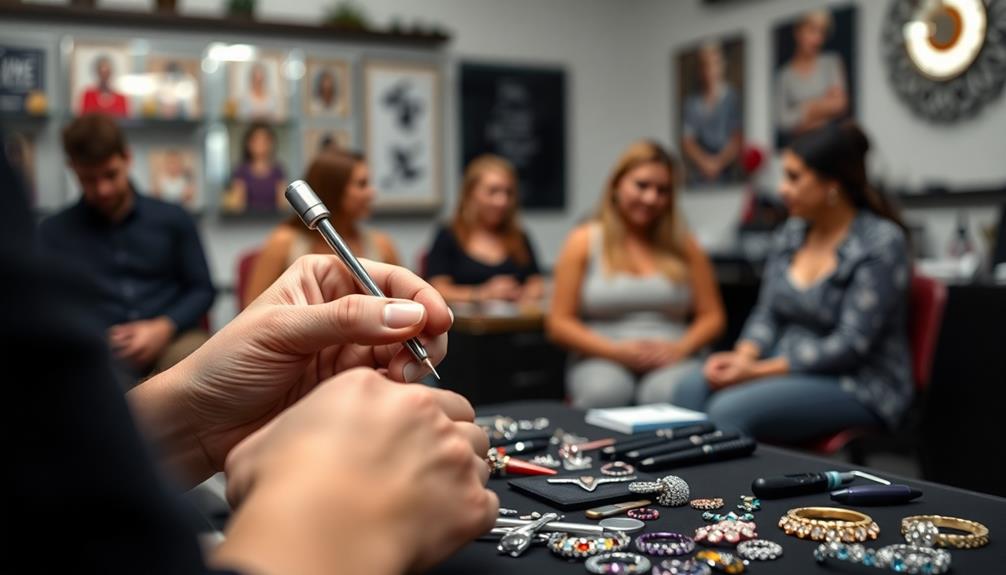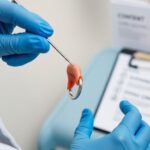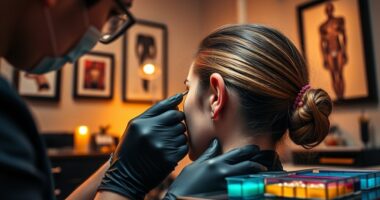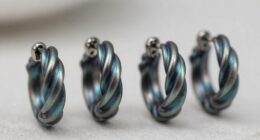As a piercer, you're not just crafting body art; you're upholding ethical standards that prioritize client safety and consent. You must communicate clearly about procedures and risks, ensuring informed decision-making. By adhering to strict health protocols and maintaining a sterile environment, you minimize infection risks and protect your clients. Continuous education is essential for you to stay updated on best practices and legal requirements. It's your responsibility to respect individual choices while also counseling against high-risk procedures. This commitment to ethics supports a responsible community in body modification. There's much more to explore about your crucial role in this field.
Key Takeaways
- Ethical piercers prioritize client well-being by refusing high-risk procedures and adhering to safety standards.
- Informed consent is crucial, especially for minors, ensuring clients understand risks and benefits before procedures.
- Strict sterilization protocols and a sterile environment are essential to minimize infection risks during body modification.
- Continuous education and training ensure piercers stay updated on health regulations and improve their skills.
- Effective communication with clients fosters trust, providing clear aftercare instructions and encouraging questions about the procedure.
Importance of Ethical Practices

When it comes to body modification, the importance of ethical practices can't be overstated. As a client, you deserve the highest standards of care and safety during your piercing experience. Ethical piercers adhere to a mandatory code of professional conduct that emphasizes cleanliness, the use of sterilized tools, and the prohibition of ear piercing guns, all to guarantee client safety.
It's vital for piercers to undergo continuous education and training. This ongoing development keeps them informed about the latest health and safety practices, directly impacting their ability to perform procedures safely.
Ethical practices also require piercers to respect your autonomy while providing accurate information about the potential risks and complications of your chosen body modification. By doing so, they foster informed decision-making.
Moreover, ethical piercers will decline to perform any procedure they assess could pose a health risk to you. This commitment to client well-being over profit is a hallmark of ethical practices.
Establishing minimum infection control standards and developing a code of ethics in body modification settings is essential for promoting safe practices and enhancing professionalism in the industry. Your safety should always come first.
Informed Consent in Piercing

When you're considering a body piercing, understanding the importance of clear communication with your piercer is crucial.
They should provide you with all the relevant information about the procedure, including any legal requirements for consent, especially if you're a minor.
This transparency helps guarantee you're making an informed choice about your body modification.
Importance of Clear Communication
Informed consent is fundamental in the piercing process, as it guarantees you have a clear understanding of what to expect before undergoing the procedure. Clear communication between you and your piercer is critical to make sure you're fully informed about the risks, benefits, and aftercare involved.
Your piercer should provide thorough information, discussing potential complications and the importance of following aftercare instructions closely to minimize health risks.
When it comes to age restrictions, clear communication is even more important. If you're a minor, your piercer needs to verify your age and obtain parental consent. This assures that your guardian is adequately informed about the procedure's implications and can support your decision.
Engaging in open discussions about your motivations for body modification fosters an environment where you feel comfortable asking questions and expressing concerns.
Remember, documentation of informed consent protects both you and your piercer legally. It serves as evidence that you were made aware of and accepted the associated risks, reinforcing the significance of clear communication throughout the piercing process.
Your understanding and comfort should always come first.
Legal Requirements for Consent
Obtaining informed consent is a significant legal requirement in the piercing industry, guaranteeing both practitioners and clients are protected. When you're considering body modifications, it's important to understand the specific legal requirements for consent in your area. This includes knowing the minimum age for getting piercings, which typically ranges from 16 to 18 years. If you're under 18, you'll likely need parental consent.
Additionally, practitioners should be knowledgeable about various types of piercings and their associated healing times, as this information is crucial for clients to make informed decisions about their body modifications, especially regarding piercing care and hygiene.
Keep these key points in mind:
- Consent documentation must be clear and thorough to safeguard both parties.
- Practitioners face legal penalties for failing to obtain proper consent.
- Local laws may vary, particularly regarding minors, so stay informed.
Being aware of these regulations not only protects you but also guarantees a smoother experience. Practitioners should emphasize health and safety standards while making certain clients understand any potential risks or complications associated with body modifications.
Health and Safety Standards
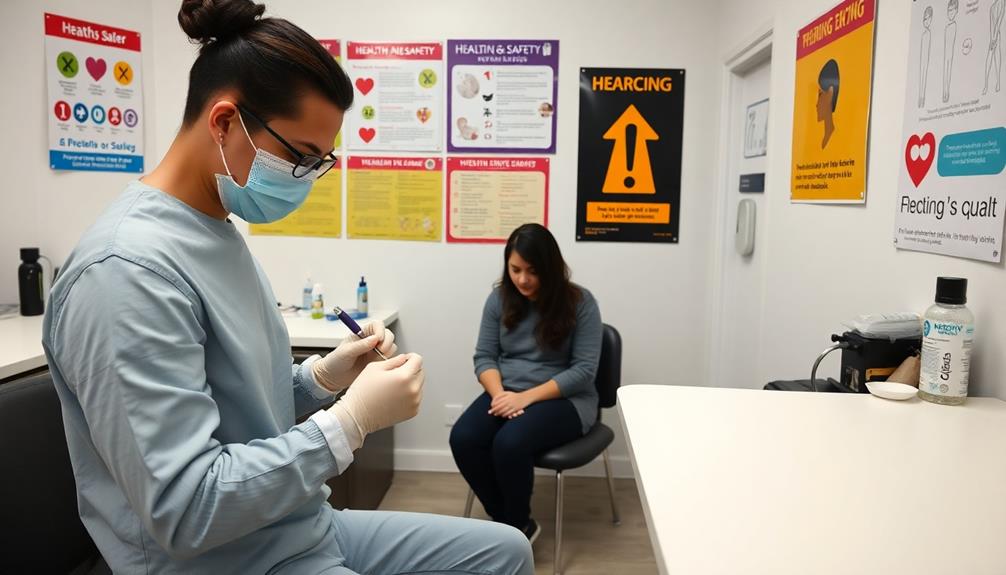
When it comes to body modification, understanding health and safety standards is essential for both you and your practitioner.
You need to guarantee that sterilization protocols are strictly followed, as they play an important role in minimizing infection risks.
Compliance with regulations and ongoing training will help maintain a safe environment for everyone involved.
Sterilization Protocols Importance
Ensuring the highest standards of sterilization protocols is essential for anyone involved in body modification. A sterile environment is important in body piercing to prevent infections and protect your clients' health. Here are some key points to keep in mind:
- Always use new medical-grade gloves for each procedure. Change them immediately if they become contaminated.
- Sterilize all piercing tools using autoclaves or dispose of them after a single use to maintain maximum hygiene.
- Designate your piercing room solely for body piercing services. Regularly clean and disinfect it with EPA-approved solutions.
Practitioners must also stay informed about local health regulations, including First Aid, CPR, and Bloodborne Pathogen training.
Regular inspections and strict adherence to sterilization protocols are essential for maintaining safety standards. Remember, failing to uphold these measures can lead to severe health complications for your clients.
Compliance With Regulations
Maintaining compliance with health and safety regulations is essential for any body piercer committed to client welfare. By upholding these standards, you not only protect your clients but also contribute to public health. Here's a quick overview of key compliance aspects:
| Compliance Aspect | Requirement | Importance |
|---|---|---|
| Gloves | Use new medical-grade gloves for each procedure | Prevents infection |
| Piercing Room | Enclosed and designated for piercing services | Maintains a sterile environment |
| Surface Disinfection | Regular cleaning with EPA-approved solutions | Minimizes cross-contamination |
| Emergency Training | Compliance with First Aid, CPR, and Bloodborne Pathogen training | Guarantees safety during emergencies |
| Legal Standards | Adhering to local health and safety laws | Upholds ethical professional conduct |
Training and Education Necessity
In the ever-evolving world of body modification, regular training and education are essential for guaranteeing that practitioners meet health and safety standards. By participating in thorough training programs, you'll not only enhance your skills but also guarantee your clients' safety and well-being.
With the increasing complexity of legal regulations surrounding body modification, understanding the importance of legal representation can further enhance your practice.
Consider these important aspects of training and education:
- First Aid and CPR: Being prepared for emergencies can save lives and instill confidence in your clients.
- Bloodborne Pathogen Protocols: Understanding these protocols is key for preventing infections and adhering to legal regulations.
- Hygiene Practices: Regularly updated training reinforces the importance of changing gloves and maintaining a sterile environment.
Moreover, it's critical to maintain a controlled piercing environment, where rooms are dedicated solely to body modification.
You should regularly clean and disinfect surfaces with EPA-approved solutions to mitigate health risks.
Continuous education keeps you informed about evolving industry standards and best practices, guaranteeing your work aligns with the highest health and safety expectations.
Prioritize training, and you'll not only enhance your professional credibility but also provide a safer experience for your clients.
Continuous Education and Training
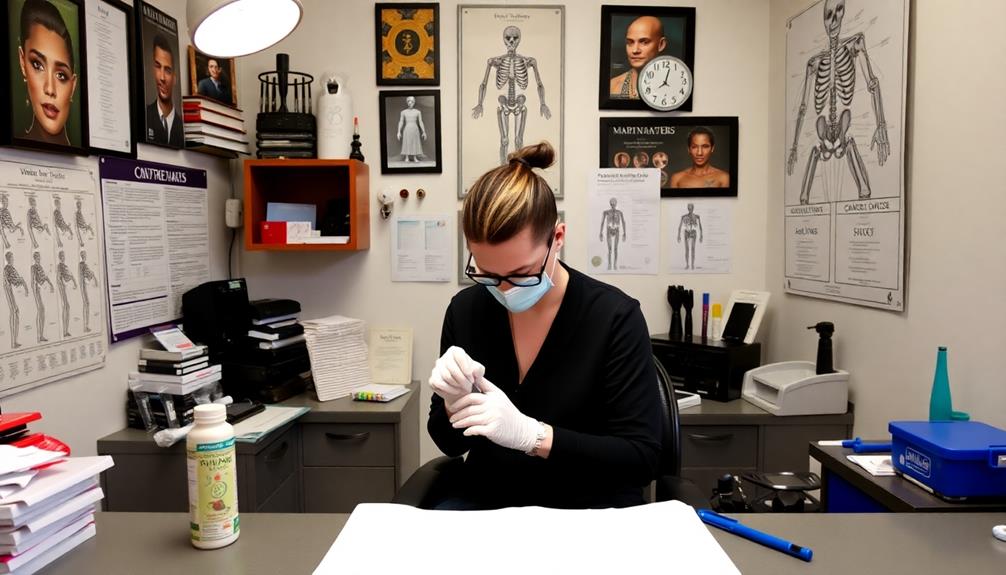
Continuous education and training are essential for piercers who want to stay ahead in the ever-evolving field of body modification. By engaging in continuous education, you stay updated on the latest health and safety standards, infection control practices, and ethical responsibilities set forth by organizations like the Association of Professional Piercers (APP).
The APP provides valuable seminars and educational resources that encourage you to enhance your skills and knowledge, fostering a culture of ongoing learning within the body modification community.
It's imperative to complete training in First Aid, CPR, and Bloodborne Pathogen protocols, as these are mandatory for APP members. This training guarantees you're well-equipped to handle any complications during procedures.
Participating in workshops not only sharpens your technical abilities but also reinforces your commitment to ethical practices and client safety.
Regular educational opportunities deepen your understanding of the moral implications of body modifications, enabling you to make informed decisions that respect your clients' autonomy and well-being.
Embracing continuous education and training isn't just about skill enhancement; it's a significant aspect of being a responsible piercer dedicated to providing safe and ethical services.
Client Communication and Support
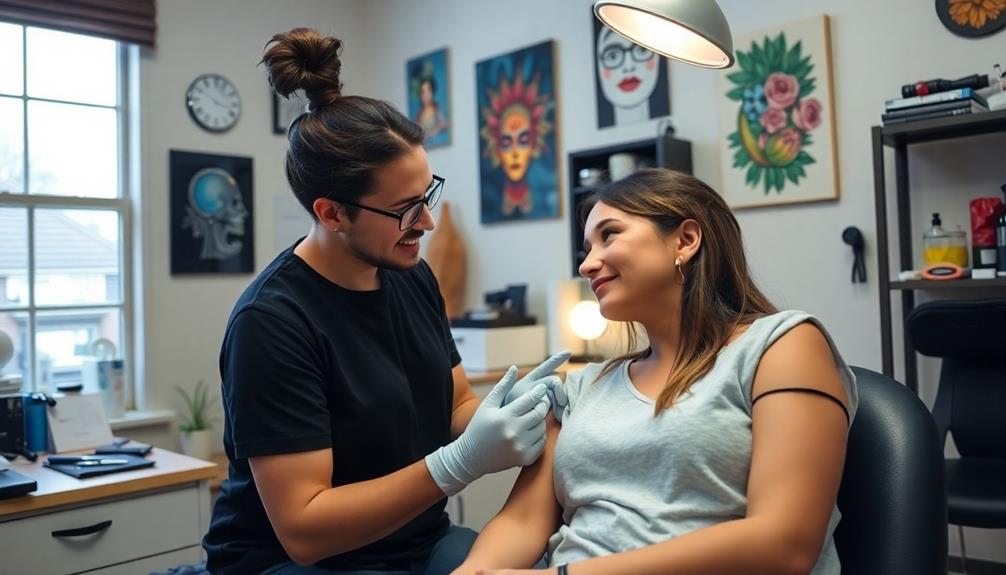
Effective communication with clients is essential for ensuring they understand both the risks and benefits of body modifications. When you take the time to discuss these aspects thoroughly, it not only builds trust but also promotes safety.
Remember, your clients might have concerns or questions, and encouraging them to voice these can create a supportive environment.
Here are a few key points to reflect on:
- Be transparent about your qualifications and experience, as this can help clients feel more secure in your ability to perform the procedure.
- Provide clear aftercare instructions, emphasizing their importance in preventing infections and complications. Proper aftercare can greatly reduce the risk of issues arising.
- Schedule regular follow-up appointments to assess healing and address any complications. This ongoing support shows your commitment to their well-being.
Respecting Individual Choices

Building on the foundation of client communication and support, respecting individual choices is a fundamental aspect of ethical body modification practices.
As a piercer, your role includes providing thorough information about the potential risks and complications associated with body modifications. This guarantees your clients can make informed decisions about their bodies.
A staggering 99.4% of body modification artists recognize the risks of spreading blood-borne diseases, which highlights your commitment to client safety while respecting their autonomy.
It's essential to balance individual desires with professional responsibility.
If a procedure poses health risks based on valid assessments, you must ethically decline to perform it.
Adhering to the APP Code of Professional Conduct is significant; it emphasizes respect for clients and promotes an environment free from discrimination and harassment throughout the piercing process.
Addressing Potential Risks
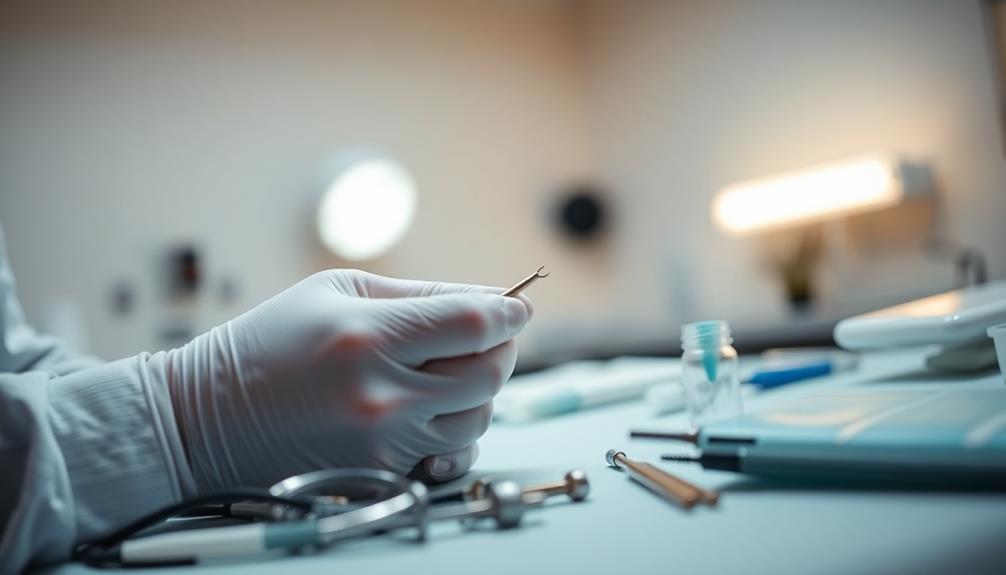
When considering body modifications, it's important to recognize the potential risks involved. Understanding these risks can help you make informed decisions and guarantee a safer experience. Here are a few key points to keep in mind:
- The risk of infection is heightened if proper aftercare isn't followed, making professional expertise significant. Proper aftercare is akin to guaranteeing a well-maintained habitat for pets, as hamster care emphasizes regular cleaning and health checks.
- Certain procedures, like tongue piercings, can lead to tissue damage and may require surgical intervention if complications arise.
- Piercing guns are discouraged due to their increased risk of infections and potential dental damage, reinforcing the need for ethical practices.
As a client, it's crucial to engage in open communication with your piercer about the specific risks associated with your chosen modification. Ethical piercers should provide you with thorough aftercare instructions and monitor your healing process.
Regularly checking for signs of infection is important to catch any complications early. If you're considering dermal implants, remember they may require replacement every 3-4 years, so stay informed and prepared.
Prioritizing these considerations will empower you to make responsible choices regarding your body modifications.
Community Responsibility and Outreach

Educating clients about body modifications is essential for fostering a responsible community. As a piercer, you have an ethical responsibility to guarantee that your clients understand the potential risks and complications. Involving yourself in community outreach initiatives can greatly enhance awareness about safe practices. You can host workshops and informational sessions that educate the public about hygiene and aftercare.
Here's a quick overview of potential outreach activities:
| Activity Type | Purpose | Audience |
|---|---|---|
| Workshops | Teach safe practices and aftercare | Clients and general public |
| Informational Sessions | Raise awareness about risks and hygiene | Local community organizations |
| Partnerships | Collaborate for improved health standards | Health departments and schools |
Engaging with local health departments can help advocate for better safety standards in the body modification industry. Building partnerships with educational institutions allows you to enhance training programs for practitioners. Additionally, participating in professional organizations like the Association of Professional Piercers (APP) empowers you to lead outreach efforts that reinforce high ethical standards in your practice.
Frequently Asked Questions
Are Piercings Body Modifications?
Yes, piercings are definitely body modifications. They intentionally alter your body's appearance, much like tattoos or implants. When considering one, make certain you choose a professional to minimize risks and guarantee a safe experience.
What Medical Issues Are Associated With Body Piercings?
When you think of body piercings, remember the tales of caution. You might face infections, tissue damage, and complications from improper care, especially with certain types like tongue piercings or gun piercings. Stay informed and safe.
What Are Two Examples of Body Modifications Being Done for Practical Purposes?
You might consider tongue splitting for enhanced oral expression or dermal implants as permanent anchors for prosthetics. Both modifications showcase practical applications beyond aesthetics, serving unique purposes that enhance functionality in different aspects of life.
What Is Considered Body Modification?
Body modification's broader boundaries include tattoos, piercings, and surgical enhancements. You'll discover these diverse designs can express identity, enhance aesthetics, or even serve practical purposes, reflecting personal choices and cultural significance throughout history.
Conclusion
In the world of body modification, you're not just a piercer; you're a guide steering through the intricate landscape of personal expression. By prioritizing ethical practices and open communication, you empower your clients to make informed choices about their bodies. Embracing responsibility guarantees that every piercing isn't just an adornment but a celebration of individuality. As you wield your needle, remember: you're crafting not just a piece of art, but a meaningful connection that honors trust and respect.

